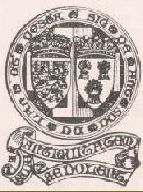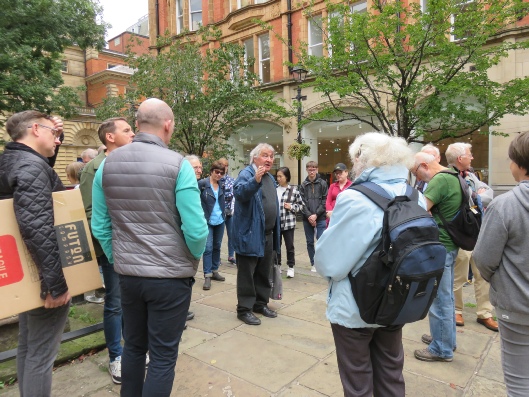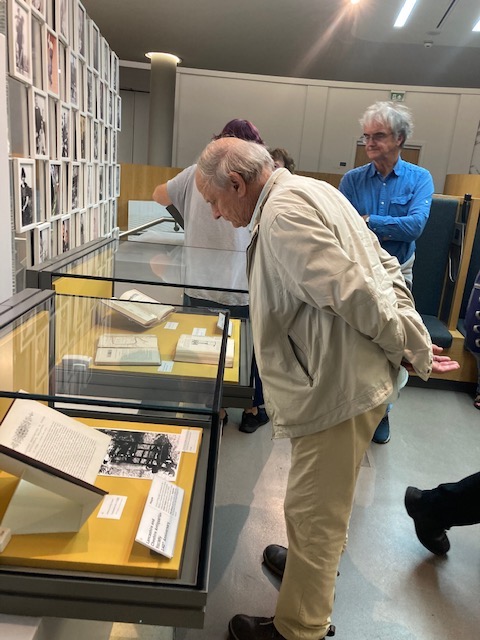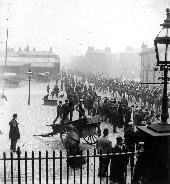
The Lancashire and Cheshire
Antiquarian Society
Founded 1883
Charity Registration No 1105708

FORTHCOMING EVENTS
Conference 11 May at the Friends Meeting House, Mount St, Manchester
The speakers and talks are:
- Ian Mitchell. Mantles and Myths: Browns of Chester c.1780-
2021 - Helen Corlett. The Cooper at Old Bridge End: Finding a Place in Early 19c Manchester
- John Marsden and Hilary Hartigan. Manchester and Lancashire Family History Society Transcription Projects
- Norman Redhead Castleshaw Roman Fort, Saddleworth: the archaeology of a newly discovered military annexe
- Neil Coldrick Medieval Ironworking in Holcombe Valley
- Kelly Griffiths Scuttled: Excavations on the Historic Canal Basin in Rochdale
Full details: New Research in the North West
Rob Drummond Manchester Voices -
How does the way we speak relate to who we are? Are there really significant differences between the accents and dialects of people across the ten boroughs of Greater Manchester? Do we even relate to the idea of ‘Greater Manchester’, or do our voices and attitudes suggest older loyalties to Lancashire and Cheshire? These are just some of the questions that were addressed in the Manchester Voices project, the largest sociolinguistics project of its kind examining the spoken language of people across Greater Manchester. The findings uncover a deep and complex relationship between spoken language and our sense of identity, and offer unique insights into how very aware many people are of the way they use language. The findings also demonstrate that accent diversity is alive and well across the region, even if some cherished dialect terms are beginning to fade away. In this talk, Rob will discuss the process and outcomes of the research, and explain why knowing more about how language works is valuable for everyone.
PAST EVENTS
On 3 April, Joanna Williams gave a talk: The Great Miss Lydia Becker: Suffragist, Scientist and Trailblazer via Zoom
Lydia Becker was brought up near Manchester in a middle-
On 6 March, Andrew Hobbs gave a talk about the History of Cheshire Life and Lancashire Life
These two familiar magazines began publication in the 1930s (for Cheshire Life) and 1940s (Lancashire Life) and attracted a massive readership. They tell us a lot about county identities, social class, people’s sense of place and attitudes to the countryside while giving us a picture of the changing nature of the “county set”.
On 21 February. Lucy Evans gave the Morris Garrett Memorial lecture: “A True Lanky: the Life and Circles of William Edward Armytage Axon (1846-
Lucy has written a biography of W E A Axon, an important figure in the history of the Antiquarian Society and an almost unbelievably prolific writer and social reformer. Lucy has tracked down over 1000 books, pamphlets, articles (including many in our Transactions), obituaries, poems, translations, stories and dialect pieces so anyone interested in the history of Manchester will have come across him at some point! He came from a difficult background, born illegitimate he was adopted by the Axons and was self-
On 24 January Brian Groom spoke about his new book titled Made in Manchester: The story of a city that shaped the modern world. This was a historical narrative of Manchester’s history of sport, music, literature and ideas, an account of the city from Roman times to the eras of Emmeline Pankhurst, Anthony Burgess, Oasis and New Order.
History of the Society Exhibition -
On Wednesday 6 December Catherine Nevell spoke about ‘The New Learning: Schooling in the North-
Terry Wyke, the Manchester historian, led a walk round St Ann’s Square in Manchester on 17 September for the Society as part of the Heritage Open Days events. The group was able to visit St Ann’s Church and see the brass name plates indicating ownership the pews by Manchester’s elite. Terry then traced the evolution of the square from upmarket housing to smart shops with stories about the square’s landmarks such as the Cobden statue, Boer War memorial and the Exchange building.

On Wednesday 13 September a small group was shown round Central Library by Jane Parr of Manchester Local Studies and Archives, and enjoyed the chance to see the stacks and some interesting items form the archive collection. The group were especially interested in the records of Prestwich Hospital and the Goad fire insurance plans with their detailed information about the occupiers of property in the city centre.

On 9 September 2023 Mike Nevell led a group round Park Bridge, between Ashton-
On Tuesday 6 June 2023 Mike Winstanley, a “retired” Senior Lecturer in History at Lancaster University, spoke about Edwin Butterworth, Lancashire’s forgotten historian (1812 -
On Tuesday 9 May 2023, our President, Mike Nevell, talked about Park Bridge at the Tameside Local Studies and Archives Centre. Park Bridge, an industrial hamlet near Ashton, was well known for its ironworks which supplied rivets for the Eiffel Tower (among other things!).
On 25 April 2023 Bernadette Hyland talked about Mary Quaile, a Manchester trade unionist. Bernadette is an activist and writer whose interests include women, class, culture and history. Her publications include Northern ReSisters Conversations with Radical Women, Dare to be Free and the blog Lipstick Socialist. She has transcribed the minute books of the Manchester and Salford Women’s Trades Council which have been donated to the Working Class Movement Library and are also available on a website. Mary Quaile (1886 1958) became involved in trade union activities while working at the Clarion Cafe in Manchester. In 1911 she began working for the Manchester Women’s Trades Council and rose through trade unionism to sit on the General Council of the TUC. She was involved with the General Strike and had trips abroad including to the Soviet Union. Bernadette is a founder of the Mary Quaile Club which was set up to hold discussions on working class history.
On Tuesday 24 January Paul Newman, Archives and Local Studies Manager at Cheshire Archives, talked about the exciting new plans for archives in Cheshire. A huge Heritage Lottery Fund grant has been approved to create two new centres in Chester and Crewe allowing better preservation of Cheshire’s collections, the expansion of learning and outreach activities and the improvement of research facilities.
On Tuesday 21 February the Morris Garratt Memorial Lecture featured Andrew Walmsley talking on 'The Mexico Disaster and the St Anne's Lifeboat Monument: Identity, Memory and Nationhood' which was based on his PhD research into this striking piece of public sculpture. The monument has been an important part of the landscape at St Anne's since its unveiling in 1888 and the talk explored its significance over time. At various times it has been an important symbol for the promotion of this seaside resort, a focus for local belonging, and an embodiment of nationhood in a local setting.
On Sunday 8 May 2022 Terry Wyke led a walk round Manchester statues. Public statues have been in the news, so this was an opportune moment to look at them again and be reminded of the historical contexts which led to the commissioning and siting of some of the city's most prominent statues and monuments. Not all public memorials and statuary have survived so consideration was also be given to those many memorials which have been removed. We began in Piccadilly Gardens considering the statues raised on Joseph Paxton's esplanade before making our way towards Albert Square via St Peter's Square.
On Wednesday 13 April 2022 Melanie Giles talked about Bog Bodies.The well-
On Wednesday 9 February 2022 Professor Nick Mansfield of UCLAN spoke on Thomas Ferriar, Mancunian South American liberator. St Ann’s Church in central Manchester contains a memorial to the Ferriar family. This includes Thomas Ferriar (1785-
On Wednesday 2 March 2022 Brian Groom, a former senior editor at the Financial Times and editor of Scotland on Sunday, spoke on Northerners, from the Ice Age to the Present Day, based on his forthcoming book Northerners, A History. He laid out the dramatic events that created the north -
Walk round All Saints Manchester, Saturday 31 July 2021
On Saturday 31 July 2021 Antiquarian Society members enjoyed a walk round All Saints in Manchester led by Terry Wyke. From Grosvenor Square to All Saints.
The making and remaking of a Georgian Square showed us the origins of the area now transformed by the MMU campus. Though planned as an upmarket address fr the prosperous encroachment by industry from the city centre soon changed the type of people who were living there, but there were imposing public buildings -
Walk at the Bridgewater Canal, Sunday 22 August 2021
On Sunday 22 August 2021 Mike Nevell led a walk at the Bridgewater Canal. We met at the Bridgewater Monument on Worsley Green in Salford in brilliant sunshine to go round the village. Mike described the recent excavations on the Green and we saw the surviving workers housing around the village, the canal infrastructure including the grain warehouse, dry docks and the lime kiln. Mike was able to explain the rather strange sculpture at Worsley Delph where he described recent conservation work. It was an illuminating account of the transport system of the Industrial Revolution.

Other past LCAS events include:
Edge of Empire: Recording the Romans; Wigan, 5 October, 2019
Visit to Bolton Museum, 9 May 2019
Keeping up with the past; 12 May 2018
Catholic history day; Saturday 12 November 2016
Visit to Wardley Hall; Thursday 3 November 2016
Manchester in the Age of Mrs Gaskell; Saturday 28 November 2015
Visit to Clayton Hall; Saturday 9 May 2015